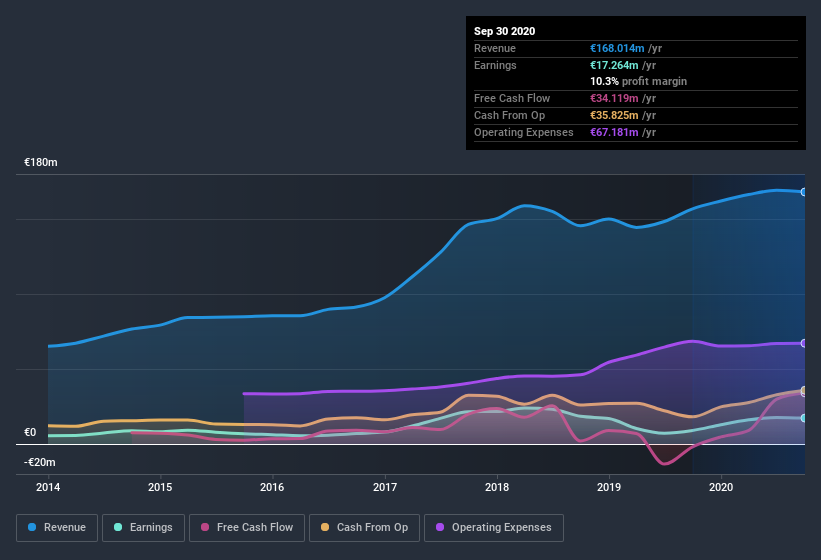Should You Use Basler's (ETR:BSL) Statutory Earnings To Analyse It?

It might be old fashioned, but we really like to invest in companies that make a profit, each and every year. That said, the current statutory profit is not always a good guide to a company's underlying profitability. Today we'll focus on whether this year's statutory profits are a good guide to understanding Basler (ETR:BSL).
It's good to see that over the last twelve months Basler made a profit of €17.3m on revenue of €168.0m. The chart below shows how it has grown revenue over the last three years, but that profit has declined.
Check out our latest analysis for Basler

Of course, it is only sensible to look beyond the statutory profits and question how well those numbers represent the sustainable earnings power of the business. Today, we'll discuss Basler's free cashflow relative to its earnings, and consider what that tells us about the company. That might leave you wondering what analysts are forecasting in terms of future profitability. Luckily, you can click here to see an interactive graph depicting future profitability, based on their estimates.
Zooming In On Basler's Earnings
Many investors haven't heard of the accrual ratio from cashflow, but it is actually a useful measure of how well a company's profit is backed up by free cash flow (FCF) during a given period. In plain english, this ratio subtracts FCF from net profit, and divides that number by the company's average operating assets over that period. The ratio shows us how much a company's profit exceeds its FCF.
Therefore, it's actually considered a good thing when a company has a negative accrual ratio, but a bad thing if its accrual ratio is positive. While it's not a problem to have a positive accrual ratio, indicating a certain level of non-cash profits, a high accrual ratio is arguably a bad thing, because it indicates paper profits are not matched by cash flow. That's because some academic studies have suggested that high accruals ratios tend to lead to lower profit or less profit growth.
Basler has an accrual ratio of -0.18 for the year to September 2020. Therefore, its statutory earnings were very significantly less than its free cashflow. In fact, it had free cash flow of €34m in the last year, which was a lot more than its statutory profit of €17.3m. Given that Basler had negative free cash flow in the prior corresponding period, the trailing twelve month resul of €34m would seem to be a step in the right direction.
Our Take On Basler's Profit Performance
Happily for shareholders, Basler produced plenty of free cash flow to back up its statutory profit numbers. Based on this observation, we consider it possible that Basler's statutory profit actually understates its earnings potential! Furthermore, it has done a great job growing EPS over the last year. The goal of this article has been to assess how well we can rely on the statutory earnings to reflect the company's potential, but there is plenty more to consider. If you want to do dive deeper into Basler, you'd also look into what risks it is currently facing. While conducting our analysis, we found that Basler has 1 warning sign and it would be unwise to ignore it.
This note has only looked at a single factor that sheds light on the nature of Basler's profit. But there is always more to discover if you are capable of focussing your mind on minutiae. For example, many people consider a high return on equity as an indication of favorable business economics, while others like to 'follow the money' and search out stocks that insiders are buying. So you may wish to see this free collection of companies boasting high return on equity, or this list of stocks that insiders are buying.
If you’re looking to trade Basler, open an account with the lowest-cost* platform trusted by professionals, Interactive Brokers. Their clients from over 200 countries and territories trade stocks, options, futures, forex, bonds and funds worldwide from a single integrated account. Promoted
Valuation is complex, but we're here to simplify it.
Discover if Basler might be undervalued or overvalued with our detailed analysis, featuring fair value estimates, potential risks, dividends, insider trades, and its financial condition.
Access Free AnalysisThis article by Simply Wall St is general in nature. It does not constitute a recommendation to buy or sell any stock, and does not take account of your objectives, or your financial situation. We aim to bring you long-term focused analysis driven by fundamental data. Note that our analysis may not factor in the latest price-sensitive company announcements or qualitative material. Simply Wall St has no position in any stocks mentioned.
*Interactive Brokers Rated Lowest Cost Broker by StockBrokers.com Annual Online Review 2020
Have feedback on this article? Concerned about the content? Get in touch with us directly. Alternatively, email editorial-team@simplywallst.com.
About XTRA:BSL
Basler
Engages in the development, manufacture, and sale of digital cameras for professional users in Germany and internationally.
Reasonable growth potential with adequate balance sheet.
Similar Companies
Market Insights
Community Narratives



